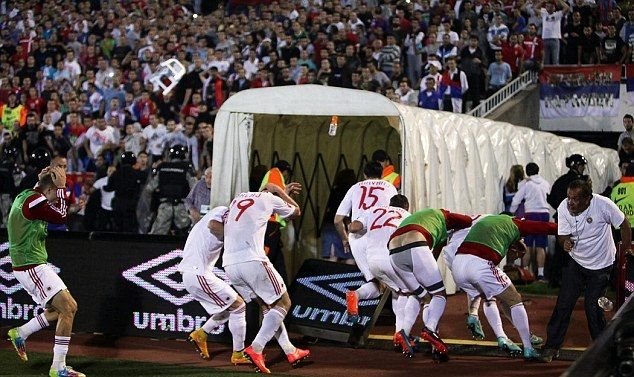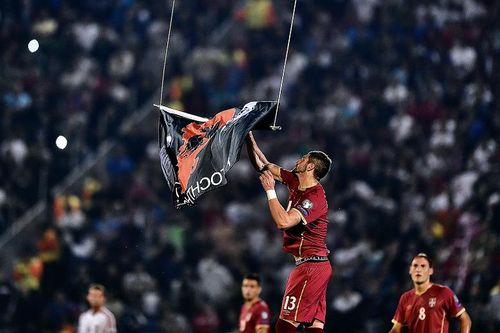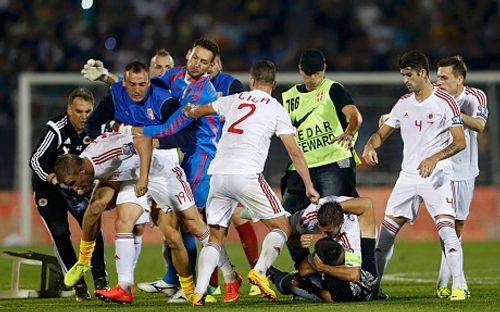
Belgrade brawl proves football will always be a platform for political and ethnic rivalry

What the world saw on Tuesday night in the Serbian capital Belgrade when Serbia took on Albania is nothing new. It is just a repeat of a growing trend of the beautiful game being used as a platform to showcase ethnic superiority or dubious publicity for a hidden political ambition bordering on hurting centuries-old religious traditions.
In UEFA’s own words, the incidents involving the Serbian and Albanian national football teams at Belgrade’s Partizan Stadium were ‘inexcusable’. But the million dollar question is whether Europe’s football governing body or even FIFA will learn from this.
UEFA’s ‘week of football’ concept involving the Euro 2016 qualifiers has been a real success, with people enjoying extended coverage of international football that for years has been subdued by the popularity of club football. Yet, the last few days have brought back dark memories of real football taking a backseat in the face of politically motivated clashes that render UEFA’s so called ‘No to Racism’ campaign useless.
Crowd disturbance across Eastern Europe
Last Saturday, Romania hosted Hungary in another highly charged Euro 2016 qualifying clash. It involved two neighbouring countries that have always maintained a volatile co-existence on the banks of the great Danube river regarding the disputed history of Romania’s World War-I annexation of Transylvania. Hungarians are the largest minority in Romania and ethnic tensions are widespread between the two Eastern European nations.
During the broadcast of the match during prime time, fans of all ages could easily feel the tension inside Bucharest’s National Stadium, as the Hungarian national anthem was disrespectfully put down by a deafening chorus of boos and abuses hurled by the Romanian home fans.
Police had to use tear gas to separate the two sets of fans at one point inside the arena. Before the start of the game, visiting Hungarian ‘ultras’ fought pitched battles with the police and rival Romanian fans burned down vehicles for the simple reason that the supporters’ program had printed the Hungarian flag wrongly.

There were no untoward events on the pitch as both sets of players conducted themselves very well in the face of immense pressure. But provocative banners were on display in the stands and flares were thrown at the players during the game that could have turned ugly.
A 1-1 result looked slightly sour for the hosts Romania despite their dominance on the field. But ultimately for UEFA, the Romanian and Hungarian football federations, everything passed well without any major incident apart from a few skirmishes.
Elsewhere, in the Bulgarian capital of Sofia, things turned ugly as Croatian and Bulgarian fans threw missiles and flares at each other, indicating the violence in the Balkans would always walk hand-in-hand despite the best efforts of the local law enforcement agencies. The Croats ultimately secured a tense 1-0 victory as the unsavoury events in Bulgaria are set to be investigated by UEFA, with sanctions expected.
Ethnic diversity in the Balkans post the break-up of Yugoslavia will always cast a dark shadow on international and club matches. Political disturbances during football matches in the Balkans are not new.
The diversity and religious rivalry stemming from the Ottoman, Catholic and orthodox Christian influences has rendered countries from the former Yugoslavia and a vast section of Eastern Europe a regional hotbed of ultra nationalism, ethnic pride and degradation of fellow human beings on the basis of religion and sexual orientation.
UEFA’s hard work in stopping crowd violence across the Balkans
Has UEFA learned any lesson in how to deal with football violence that keeps raising its ugly head in the Balkans? This is the same region where football was and is being repeatedly and unfairly used to bully rival clubs and ethnicities. Many historians believe that the seeds of Croatia’s war on independence from Yugoslavia were sown in Belgrade when Hajduk Split beat Red Star Belgrade in the last ever Yugoslav Cup final in the early 1990s.
The unnecessary provocation at the Partizan stadium brought back those bitter memories, when one idiot decided he had had enough of watching the football game and that the time had come to open up old wounds that will be felt for some time in the coming future. And this was right in the middle of a game played between two bitter historical rivals that was conducted with a bit of common sense amidst all the tension up to the point.

Minority of hooligans render UEFA’s efforts to eradicate football violence futile
Questions do arise as to why these incidents keep happening in the Balkans, or for that matter Belgrade and Serbia. After the Genoa riots in October 2010, when Serbian fans forced a Euro 2012 qualifier between Italy and Serbia to be postponed, Serbia’s handling of football matches both at the club and international level came to the forefront. And after hefty punishments from UEFA, things looked settled but tense.
Yet, provocative and anti-semitic banners are a regular occurrence during matches involving Serbian clubs. The UEFA, it seems, has run out of ideas to deal with the situation. Europe’s football governing body has come under criticism as to why Serbia and Albania were not kept apart during the qualifying draw held in February as the two countries separated by the disputed territory of Kosovo share a tense history and bad blood.
We may not be able to come to a conclusion as to who flew the remote controlled drone carrying pro-Albanian banners in the middle of a stadium that had a huge police presence. But one thing is for sure: the protagonist, whether Albanian or Serbian, did not want to give football a chance to somehow bridge a long gap.
Sanctions awaited against Serbian and Albanian FAs
Sanctions will be imposed on both Serbia and Albania, and repercussions from this abandoned match will be felt for some time to come. But that is where the UEFA’s limit ends. Publicity has been gained by the idiots who crave for another Balkan tragedy, courtesy of football’s popularity, and this is where the beautiful game’s curse lies.
The world’s most popular sport is being used as a tool to express ethnic superiority despite the best efforts by the authorities to put an end to it. Mere fines and closed stadiums will not work until and unless the respective federations are banned from playing any competitive football in the near future. That might sound pretty harsh since a whole football nation cannot always be blamed for the actions of a small minority of hooligans and criminals, but I don’t see any other way out.
The ugly scenes at Belgrade should never happen in front of the eyes of millions of young football fans, who regard the game as part and parcel of their lives. But having said that, these incidents will never be far from our television sets due to ethnic tensions across the Balkans and Europe as a whole.
